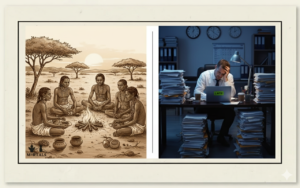Anthropology, as a formal discipline, might be relatively young, but its origins lie in centuries of human curiosity about cultural differences, the antiquity of our species, and our biological origins. In the 19th century, these streams of thought converged, fueled by global exploration and scientific advancements, to give birth to the field we know today.
The Long History of Cultural Curiosity
From Herodotus’ fantastical descriptions to Ibn Khaldun’s ‘science of civilization’, humans have long been fascinated by the diversity of cultures they encountered. European expansion from the 15th century onwards intensified this curiosity, forcing them to grapple with fundamental questions about the nature of humanity and the origins of social differences.
Degenerationism vs. Progressivism
The concept of ‘degenerationism’ offered a biblically-based explanation for cultural diversity, suggesting that societies had fallen from a previously civilized state. In contrast, ‘progressivism’ posited that societies started out primitive and were gradually advancing. Philosophers like John Locke contributed to this view, proposing that human knowledge and reason were derived from experience, thus explaining cultural differences.
The Rise of Scientific Inquiry
The 18th century saw a shift towards scientific investigation and empirical observation. The discovery of fossils and ancient artifacts challenged biblical chronologies, raising questions about the antiquity of humans and the evolution of life. Naturalists like Linnaeus and Buffon laid the groundwork for evolutionary thinking, classifying life-forms and observing variations within species.
Lamarck and Darwin: Pioneering Evolutionary Theories
Jean Lamarck and Erasmus Darwin, Charles Darwin’s grandfather, proposed evolutionary theories in the late 18th century. Lamarck believed that changes in the environment led to physiological needs, promoting the formation of new organs or alteration of old ones. These acquired characteristics were then passed on to future generations.
Charles Darwin and Natural Selection
Charles Darwin’s theory of natural selection revolutionized our understanding of biological evolution. He proposed that variations within species, coupled with the struggle for survival, led to the selection of individuals with advantageous traits, ultimately resulting in the evolution of new species. This theory had profound implications not just for biology,but also for social thought, offering a framework for understanding progress and social change.
Herbert Spencer and Social Darwinism
Herbert Spencer applied evolutionary principles to social phenomena, coining the phrase ‘survival of the fittest’. His ‘organic analogy’ compared human societies to biological organisms, suggesting that social evolution could be studied in the same way as biological evolution. While Spencer’s ideas were influential, they also led to the controversial concept of ‘social Darwinism’, used to justify imperialism and colonialism.
Unilineal Evolutionism: Morgan and Tylor
Lewis Henry Morgan and Edward Burnett Tylor were prominent figures in unilineal evolutionism, believing that all societies progressed through the same stages of cultural development. Morgan focused on the evolution of family structures and subsistence patterns, while Tylor studied ‘survivals’ – cultural remnants from earlier stages – and proposed a theory of the evolution of religion.
Karl Marx and Historical Materialism
Karl Marx and Friedrich Engels, though not anthropologists, offered a materialist perspective on social evolution. They focused on the historical development of capitalism and class struggle, viewing social change as an evolutionary process marked by revolution. Their ideas have been influential in various anthropological theories, particularly those concerned with power and inequality.
The Legacy of 19th-Century Evolutionism
The 19th century laid the foundation for anthropological thought, with evolutionary theories shaping our understanding of both biological and social change. While many of these early ideas have been challenged and refined over time, they continue to influence contemporary anthropology. The debates and controversies surrounding concepts like social Darwinism and unilineal evolutionism highlight the complex relationship between anthropology and its historical context.
Understanding this foundational period is essential for any student of anthropology. It allows us to appreciate the intellectual roots of the discipline, critically examine the assumptions of early theorists, and recognize how anthropological thought has evolved in response to new evidence and changing social contexts.




